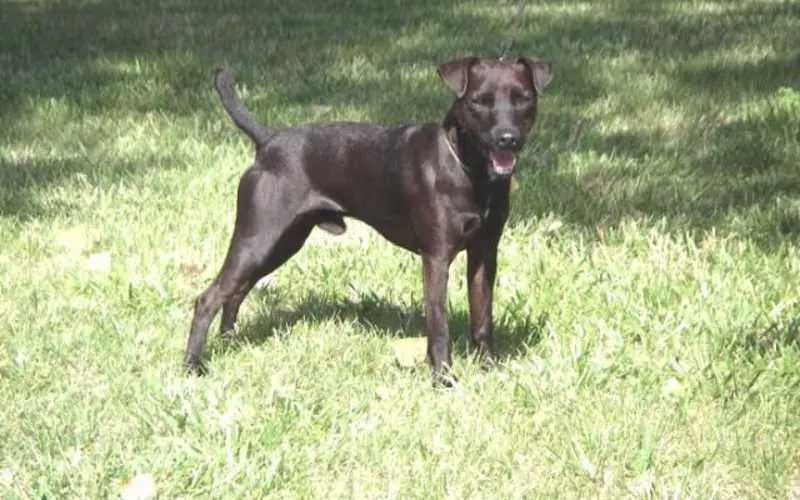Patterdale Terrier Barking
patterdaleterriers.co.uk is a participant in the Amazon Services LLC Associates Program and other affiliate advertising programs designed to provide a means for us to earn fees by linking to Amazon.co.uk and affiliated sites. Affiliate links may be used on this page and in patterdaleterriers.co.uk articles, but they do not impact on the price that you pay and they do help me to get this information to you for free. Read my privacy policy for more information regarding affiliates.
You might hear from some Patterdale terrier owners that they are not really big barkers. Well, either it’s a total lie, or mine is a massive exception to that rule! Our Patterdale cross barks all the time for many different reasons. We have basically learnt which barks mean different things. For example, he has a demanding bark which means he is asking to go to the loo, and alerting bark when the doorbell goes and an aggressive bark when he sees something he wants to kill but is on lead! Oh my! So today’s blog is all about Patterdale terrier barking. Why do they do it? And is it possible to stop it?
Patterdale Terrier Barking – Why does my terrier bark?
There are many reasons why your Patterdale terrier may be barking. It could be any of the following reasons:
- Aggression
- To tell you he needs something
- Playing
- Alerting you to the door bell
- Frustration bark
- Separation Anxiety
Aggression
A bark out of aggression is usually louder and is accompanied by growling and snarling. Some Patterdales display on-lead aggression towards other dogs, particularly if they were not socialised as puppies. This kind of behaviour needs to be sorted out through training as it could scare other dogs or even worse, trigger a fight.
To tell you he needs something
Many Patterdale terriers will bark when they need something, and this is a bark that you will quickly recognise – it is often a bark that is accompanied by crying first. This could be because he/she needs the loo, food or water.
Play Barks
A play bark is usually a one off when your dog is looking at his toy or ball or asking you to play it could be accompanied with a playful grown or grumble!
Alerting you to an Intruder or Visitor
An incessant bark followed by a knock at the door, doorbell or someone walking past the house is a bark that is alerting you to the fact that someone is there. They are protecting their property or guarding their territory.
Frustration
A bark out of frustration may occur when your Patterdale is on the lead and he is frustrated that he can’t get to something such as another dog to sniff his butt! It is easy to get a frustration bark mistaken for an aggressive bark. The only way you will know which of these it is will be to monitor his behaviour with other dogs in a controlled environment with a dog trainer who has muzzles and can take care of the situation. Always introduce dogs safely.
Separation Anxiety
If your dog barks repeatedly and even howls when you leave him in the house alone, this could be a sign
How can I stop my Patterdale Terrier Barking?
The truth is that you can’t completely stop your Patterdale terrier from barking, but you will be able to learn to control it through dog training. Here are some tips on preventing your Patterdale terrier from Barking.
Avoid Shock Collars
It’s been tried and tested – shock collars don’t work. They are also very cruel. In fact, a shock collar is a scary experience for a dog and if a dog is fearful this can increase barking and actually can make your situation even worse. We recommend that you completely avoid them.
Give your dog a lot of Exercise
Many Patterdales are stir crazy when they are kept in the house. Make sure that they get at least 2 walks a day plus off lead time. This will give them chance to spend their energy positively. The more pent up energy they have, the more they will bark. If they have been tired out, they are more likely to rest and have a sleep when you go out.
Use Puzzles and Games to distract them
It;s a great idea to use puzzles and games and treats to distract your dog from what they are always barking at. For example, if your dog always barks at visitors, prepare him a licky mat or a kong stuffed with doggy peanut butter or Kong Easy Treat.
If your dog barks due to separation anxiety then leave him with some hidden treats or dog puzzles when you go out. I love the Nina Ottosson dog toys such as this:
Use Positive Reinforcement for Training
You can use positive reinforcement or clicker training to train your dog, This involved giving a click and a treat to mark good behaviour – in this case, not barking. It should not be used as a distraction, so as soon as the
You might also like to read: Help! My dog won’t stop pulling on the lead!










